|
|
|
Sort Order |
|
|
|
Items / Page
|
|
|
|
|
|
|
| Srl | Item |
| 1 |
ID:
148792
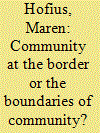

|
|
|
|
|
| Summary/Abstract |
This article contributes to the communities of practice (CoP) literature by focusing on the neglected role of the boundary in constructing community. It takes issue with advocates of International Relations’ (IR) most recent ‘practice turn’ who have overrated inclusive practices of linking to the detriment of taking account of exclusive practices of demarcation. A conceptual turn to the boundary, understood as a ‘site of difference’, highlights how the two sets of practices operate simultaneously in creating shared senses of belonging to a community. The article empirically probes this turn to the boundary by studying how the postmodern community of the European Union (EU) is (re)constructed by EU diplomats in its neighbouring state Ukraine. As a borderland, it symbolises an interstitial zone of high connectivity where the EU’s otherwise latent order is unearthed. A reconstructive analysis of interviews with members of this ‘community of practice’ reveals that they function as ‘boundary workers’ who engage in both boundary-spanning and boundary-drawing practices on an everyday basis. Zooming in on the ‘boundary work’ by EU diplomats exposes the complex process of community-building and thereby helps grasp community as an emergent structure of possibilities whose meaning is contextually mediated by its members’ social experience of the boundary.
|
|
|
|
|
|
|
|
|
|
|
|
|
|
|
|
| 2 |
ID:
173739
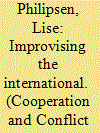

|
|
|
|
|
| Summary/Abstract |
In this article, I argue that the introduction of ethnography to International Relations has not taken full advantage of the potential of bringing these two fields together. Using international intervention as an example, I suggest that to bring out this potential we need to be more attentive to the classical virtues of ethnography. This means taking the subjects of our studies much more seriously, as people capable of making sense of and reacting to the structures of power they are embedded in. Here implementers tasked to put international policies into action in relation to a concrete context provide an overlooked source of knowledge. Using their experiences, reflections and ways of dealing with the concrete dilemmas that arise in their daily work enables us to analyse intervention as concrete relations of power that play out, affect and are mitigated by people in the field. Seeing knowledge as in this manner arising from the field provides a deeper knowledge that is necessary if we want to read intervention not only as an exertion of power from the international to the local, but as dynamically reshaped, resisted and made sense of in the field.
|
|
|
|
|
|
|
|
|
|
|
|
|
|
|
|
| 3 |
ID:
190174
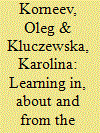

|
|
|
|
|
| Summary/Abstract |
Examining the European Union’s (EU) engagement with Central Asia since the early 1990s, we see an increased commitment to context sensitivity. Arguably, in order to design ‘better’ interventions, the EU needs to know more about this region. This article explores three means of EU learning: in the field – through EU officials’ first-hand experience of working at EU Delegations in Central Asia; about the field – through programmed channels of external expert knowledge, and in particular think tanks; and from the field – during institutionalized consultations with multiple local actors, such as academics, journalists and non-governmental organizations. It is argued that despite this complex learning infrastructure, EU knowledge production on Central Asia has a predominantly performative character. Rather than leading to changes in its relations with Central Asia, new knowledge produced by the EU aims at legitimizing this organization’s pre-existing frameworks of engagement and practices of interactions with the region, and substantiating existing policy priorities.
|
|
|
|
|
|
|
|
|
|
|
|
|
|
|
|
| 4 |
ID:
144063
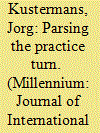

|
|
|
|
|
| Summary/Abstract |
A substantial body of literature centers on the concept of ‘practice’. This article parses the practice turn in International Relations. It suggests that the meaning of ‘practice’ is a moving target. Sometimes it means process. Sometimes it refers to a particular type of knowledge and related action. And sometimes it is used as a quasi-synonym for institution. There are actually three concepts animating the practice turn: ‘practice’, ‘practical knowledge’, and ‘practices’. These concepts hail from different intellectual pastures and lead to different ways of explaining and understanding international relations. The article introduces the three concepts, explains how each concept entails a particular interpretation of the nature and possibility of change, as well as affords a particular theory of peace(making).
|
|
|
|
|
|
|
|
|
|
|
|
|
|
|
|
| 5 |
ID:
138083
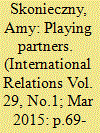

|
|
|
|
|
| Summary/Abstract |
In this article, I argue that seemingly ‘un-noteworthy’ interactions between states can demonstrate the significance of language for social relationships and foreign policy partnerships. Using language game analysis, I apply Peter Howard’s four-stage model to the case of the US–Turkish Economic Partnership Commission’s proposal for qualified industrial zones shortly after 9/11 and examine how the expectations for enhancing partnership are shaped and at times dashed through the language used among a network of actors. A language game analysis provides an explanation for how actors’ expectations rise and fall and provides an understanding of the maintenance, enhancement, and dismantling of state relationships in a social and practice-centered context. I utilize author interview data as well as texts from newspapers, speeches, and organizations to show how partnership between allies is vulnerable to social expectations signaled in and through the common language they both hold.
|
|
|
|
|
|
|
|
|
|
|
|
|
|
|
|
| 6 |
ID:
154462
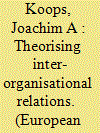

|
|
|
|
|
| Summary/Abstract |
This article explores the historical evolution of research on the “European Union (EU)–North Atlantic Treaty Organisation (NATO) relationship” since the 1950s and examines the numerous ways in which it has served as an important case study for applying and developing theory-guided and conceptual research on inter-organisational relations (IOR) in International Relations. After a dearth of policy-oriented research during the 1990s and early 2000s, a wide range of scholars have contributed to a “conceptual turn” in the study of EU–NATO during the last decade. This development, as this article will argue, not only signifies a stronger interest by scholars to understand the complex relationship between both organisations with the help of more theory-driven research, but also highlights that the EU–NATO relationship has become a “catalytic case study” in terms of inspiring conceptual experimentation and advancing efforts to theorise IOR more generally. The article provides for the first time a systematic stock-taking and analysis of the richness of concepts and theoretical debates related to EU–NATO relations research and offers scholars wider insights into the most promising approaches and analytical tools for understanding and theorising EU–NATO relations.
|
|
|
|
|
|
|
|
|
|
|
|
|
|
|
|
|
|
|
|
|